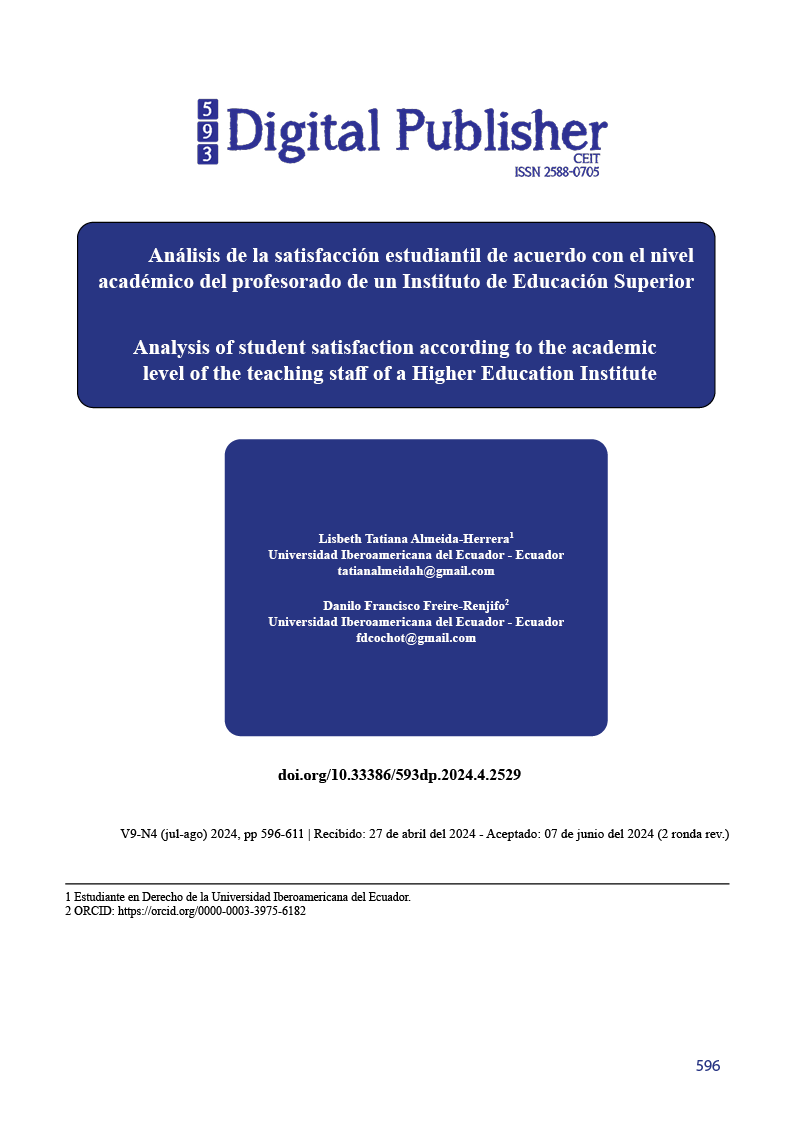Analysis of student satisfaction according to the academic level of the teaching staff of a Higher Education Institute
Main Article Content
Abstract
The study addresses student satisfaction in technical and technological higher education institutions, focusing on how the academic level of the teaching staff affects this perception. Using a quantitative design, a questionnaire was applied that evaluated aspects such as the quality of teaching and the academic training of teachers. The results indicate that teachers' advanced degrees, such as master's degrees and doctorates, contribute positively to teachers' perceived competence. However, it is highlighted that factors such as teachers' ability to establish meaningful connections with students and adapt their teaching to individual needs are equally crucial to student satisfaction. This research highlights the importance of integrating solid academic training with effective pedagogical skills to raise educational quality. Also mentioned is the need for more studies that address challenges such as school stress and dropout, and that seek to improve infrastructure and support services to create an educational environment that meets the expectations and needs of students.
Downloads
Article Details

This work is licensed under a Creative Commons Attribution-NonCommercial-ShareAlike 4.0 International License.
1. Derechos de autor
Las obras que se publican en 593 Digital Publisher CEIT están sujetas a los siguientes términos:
1.1. 593 Digital Publisher CEIT, conserva los derechos patrimoniales (copyright) de las obras publicadas, favorece y permite la reutilización de las mismas bajo la licencia Licencia Creative Commons 4.0 de Reconocimiento-NoComercial-CompartirIgual 4.0, por lo cual se pueden copiar, usar, difundir, transmitir y exponer públicamente, siempre que:
1.1.a. Se cite la autoría y fuente original de su publicación (revista, editorial, URL).
1.1.b. No se usen para fines comerciales u onerosos.
1.1.c. Se mencione la existencia y especificaciones de esta licencia de uso.
References
Armas, T. A. D. (2020). Evaluación de la faceta epistémica del conocimiento didáctico-matemático de futuros profesores de matemáticas en el desarrollo de una clase utilizando funciones. Bolema: Boletim de Educação Matemática, 34, 110-131.
Enriquez, J. D. (2022). Gestión estratégica, formación integral y su relación con la calidad educativa de los institutos de educación superior tecnológico privados de la provincia del Cusco, período 2019. http://200.48.82.27/handle/20.500.12918/6477
Espinoza, I. E. (2020). Análisis de implementación de la política pública de educación superior en el Ecuador: Una visión desde la calidad institucional universitaria (2010–2018). https://repositorio.flacsoandes.edu.ec/handle/10469/16741
Marcano, P., & Uribe, A. M. (2022). Satisfacción estudiantil como un indicador de la calidad educativa. https://repositorio.upse.edu.ec/handle/46000/8246
Mera, R. H. C., & Andrade, J. P. (2019). La acreditación y su aporte a la satisfacción estudiantil de las universidades públicas de Manabí- Ecuador. ECA Sinergia, 10(2), 82-95.
Mireles, M. G., García, J. A., Mireles, M. G., & García, J. A. (2022). Satisfacción estudiantil en universitarios: Una revisión sistemática de la literatura. Revista Educación, 46(2), 610-626. https://doi.org/10.15517/revedu.v46i2.47621
Moreno, D., Bravo, E. R., Burgos, C. J., & Grijalva, A. A. (2021). Educación superior y pandemia: Estudio piloto del cuestionario de experiencia educativa durante pandemia. Revista digital de investigación en docencia universitaria, 15(1). http://www.scielo.org.pe/scielo.php?script=sci_arttext&pid=S2223-25162021000100003
NORMATIVA PARA LA EVALUACIÓN DEL DESEMPEÑO DOCENTE, Pub. L. No. Registro Oficial, 430 (2019). Ediciones Legales EDLE S.A. Recuperado de: https://www.fielweb.com/Index.aspx?31&nid=1123037#norma/1123037
Ospina Rave, BE, Sandoval, JD, Aristizábal Botero, CA, & Ramírez Gómez, MC (2005). La escala de Likert en la valoración de los conocimientos y las actitudes de los profesionales de enfermería en el cuidado de la salud. Antioquia, 2003. Investigación y Educación en Enfermería , XXIII (1), 14-29.
Palacio, A., Arévalo, P., & Guadalupe, J. (2017). Principales factores organizativos que influyen en la satisfacción estudiantil de las universidades. Economía y Negocios, 8(1), 32-40.
Pérez, P., Zambrano, L. L., & Mejía, J. G. (2021). Profesionalización docente en el Ecuador: Una experiencia de justicia e inclusión social. Acta Scientiarum. Education, 43. http://educa.fcc.org.br/scielo.php?pid=S2178-52012021000100106&script=sci_arttext
Posner, George (2005), Análisis del currículum, México, Macgraw-Hill.
Primicias. (2023). Ecuador tiene nuevo Reglamento de Ley de Educación Intercultural. Primicias. https://www.primicias.ec/noticias/sociedad/ley-educacion-intercultural-reglamento/
Ramírez, G. L. (2020). Estudio comparativo del nivel académico de los estudiantes de bachillerato intensivo y bachillerato general unificado. Conrado, 16(73), 377-384.
Velásquez, E. (2021). Análisis de dos grupos etarios con Covid-19 para evaluar supervivencia utilizando las pruebas Kaplan-Meier. Revista médica (Colegio de Médicos y Cirujanos de Guatemala), 160(2), 133-139.



